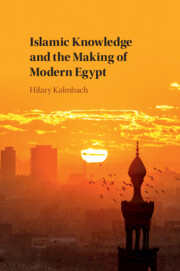Book contents
- Islamic Knowledge and the Making of Modern Egypt
- Islamic Knowledge and the Making of Modern Egypt
- Copyright page
- Dedication
- Contents
- Figures
- Acknowledgements
- Preface
- Notes on Transliteration and Use of Arabic
- Introduction: Hybridity, Islamic Knowledge, and ‘Being Modern’ in Egypt
- 1 Reform, Education, and Sociocultural Politics in Nineteenth-Century Egypt
- 2 Dar al-ʿUlum: Hybridity, Education, and Sociocultural Change, 1871–1900
- 3 Hybridity, Islamic Knowledge, and the Formation of Egyptian National Culture, 1882–1922
- 4 Fighting over the Future of Egyptian National Culture, 1923–1952
- Conclusion: Authority, Authenticity, and Revolution
- Book part
- Bibliography
- Index
Introduction: Hybridity, Islamic Knowledge, and ‘Being Modern’ in Egypt
Published online by Cambridge University Press: 02 October 2020
- Islamic Knowledge and the Making of Modern Egypt
- Islamic Knowledge and the Making of Modern Egypt
- Copyright page
- Dedication
- Contents
- Figures
- Acknowledgements
- Preface
- Notes on Transliteration and Use of Arabic
- Introduction: Hybridity, Islamic Knowledge, and ‘Being Modern’ in Egypt
- 1 Reform, Education, and Sociocultural Politics in Nineteenth-Century Egypt
- 2 Dar al-ʿUlum: Hybridity, Education, and Sociocultural Change, 1871–1900
- 3 Hybridity, Islamic Knowledge, and the Formation of Egyptian National Culture, 1882–1922
- 4 Fighting over the Future of Egyptian National Culture, 1923–1952
- Conclusion: Authority, Authenticity, and Revolution
- Book part
- Bibliography
- Index
Summary
This chapter introduces the main tenet of the book: that tensions over public expressions of Islam in Egypt have a 130-year history, as they stem from decisions made in the half-century surrounding the turn of the twentieth century (1871–1922), and they first erupted into conflict during a ‘culture war’ that shaped the intellectual discourse of Egypt’s constitutional period (1923–52). Dar al-ʿUlum and its graduates, the darʿamiyya, are crucial to understanding this culture war. After providing historical background, this chapter explains a new approach to modernisation, nation-building, and sociocultural change. It presents modernity as a constellation of projects advanced by Egypt’s ruling Khedives, Europeans, and a range of Egyptian-based social groups. It uses the ideas of Pierre Bourdieu, Frederik Barth, and Mikhail Bakhtin to connect educational experiences with sociocultural outcomes using capital and habitus, to explore how sociocultural boundaries are crossed in productive ways, and to widen definitions of hybridity beyond combinations that are shockingly jarring. It uses these ideas to explore the sociocultural position of the darʿamiyya, a group that was suspended in between the modernising alumni of civil schools (efendiyya) and the traditionally trained alumni of religious schools (shaykhs) until a 1926 student strike.
Keywords
- Type
- Chapter
- Information
- Islamic Knowledge and the Making of Modern Egypt , pp. 1 - 48Publisher: Cambridge University PressPrint publication year: 2020



